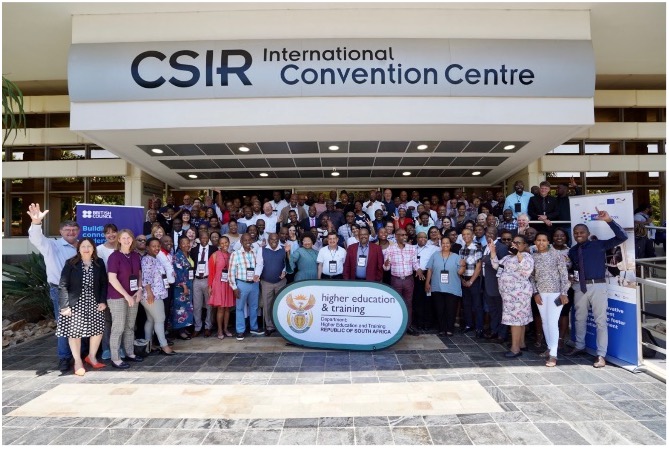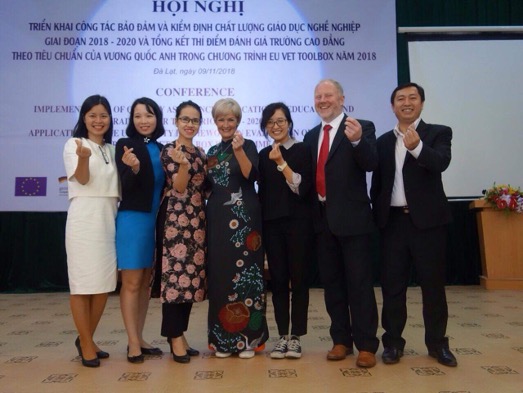
CAVC Private – Public Partnership in China
In 2016 Shanghai YiJin Education Consulting signed a memorandum of understanding with Cardiff and Vale College (CAVC) to develop a partnership model based on preparing students from China for study in UK Higher Education.
In 2017 the CAVC Shanghai School was opened based on a 2+1 A Level pathway model. Two further Schools, CAVC Changzhou and CAVC Pinghu opened for business in 2019 and 2020 respectively. In addition to the pathway model, CAVC committed to delivering a comprehensive teacher training programme to YiJin teachers and a structured Quality Assurance service.
Five years into the partnership and CAVC have recognised that some learners would be better suited to a non-A Level and more vocationally orientated route. Therefore in conjunction with the Welsh awarding body, Agored, CAVC have developed a Level 3 Diploma in Business and Management for International students. This year 11 students are pursuing this route online due to the pandemic. CAVC have plans to extend the Diploma options to Accounting and Finance, IT and Cyber Security and Engineering for a September 2021 start. Thereafter our vision is to bring Technical and Vocational Education and Training ( TVET) programmes on stream in the new and fast emerging occupational skills areas such as green technologies, AI and big data.
The decision to offer a TVET alternative to A Level is also in line with the skills ‘Zeitgeist’ which is emerging globally. In China there has been a significant strengthening of focus on TVET underpinned by the 2019 Government work report announcing a transfer of 100 billion RMB funding into vocational training to support 15 million people to upgrade their skills and significant capacity building via an expanded higher vocational College network and incentivisation.
Cardiff and Vale College, part of the Colleges Wales International network, provides world-class catering and hospitality skills and training provision to students of all ages.
CAVC have a range of performance and skills development tools at their disposal that quickly evaluate training needs around skills training. They are highly responsive to the commercial needs of industry.
The CAVC and international team are to support the important administration and management requirements that underpin high-quality educational delivery.
Our mission at CAVC is to transform lives by enabling learners to develop skills and reach their potential.
Partnership work in China is both invigorating and challenging.
The partnership with YiJin is starting to reach a level of maturity and experiencing an improved cultural understanding and inter-connectedness.
CAVC have gradually introduced a more formal framework to discuss pedagogic and curriculum development issues. Its partner now increasingly recognises that some students recruited in China will be best served following the Diploma pathway.
This is often a challenge with parents who are heavily invested in the concept and educational capital of the UK A Level system. However, CAVC have enjoyed productive dialogue with colleagues and both parties can see the increasing political prioritisation of the vocational agenda in the reform and revitalisation of skills in both China and the UK.
| The partnership has resulted in a number of skills solutions and process innovations not least in relation to online delivery. CAVC think that a proportion of these initiatives can be retain as it transitions into the so-called new normal in the next 12-18 months.
These solutions apply mainly to 3 areas: The Pathway model: The pathway model is being adapted and developed to provide students with a vocational route to CAVC and UKHE which CAVC would like to eventually see having parity with the traditional academic A Level route. This is key to raising the profile of TVET education in both China and the UK. |
The CPD Programme: Continual Professional Development (CPD) can be challenging to deliver in international education contexts. This is compounded by issues around time zones and cultural mores. Despite this CAVC has designed a 2 year programme consisting of 6 rotations spread over the period.
These are currently being delivered online, but will revert to a blend of online and in-person training in China, post-pandemic. The programme consists of a mixture of generic and subject specific sessions and is informed by pedagogy from both western and eastern perspectives. Colleagues in China are actively invites to engage in the design and evaluative phases to ensure that the programme is culturally for for purpose and upskills effectively.
The Quality Assurance Model: The QA model has similarly evolved and been adapted to the challenges of the pandemic. The process is currently undertaken online and involves a questionnaire to elicit key information followed by an interview with key stakeholders at the China Colleges to deep dive into the different areas of provision.
CAVC may request soft copies of evidence to corroborate assertions. A number of good practice initiatives have emerged from this process including greater interaction between counterpart teaching staff, improved English language support, remote tutorial provision for individual students and the emergence of a support programme for high performing students.
The long term outcomes of this partnership are manifold. They can be broken down into three distinct categories: impacts on vocational training; impacts on teacher training and Continuous Professional Development (CPD); and impacts on Quality Assurance approaches. These add value in both the UK and China.
In relation to TVET, our aim is to encourage more and more Chinese students and their parents to consider a more vocationally orientated route into British tertiary education, including enrolment into HNC and HND courses. Historically and culturally, Chinese students studying in the UK have tended to opt for programmes such as Business Studies and Accounting and Finance.
CAVC’s aim is to design, develop and offer a range of Diploma programmes which focus more on contemporary and emerging vocational skills as identified by employers and the contemporary labour market. A market for these skills will have the effect of accelerating curriculum development and College investment in these skill areas. Eventually, graduates from this pathway will return to China to better equip the workforce to meet the considerable demands of the Chinese economy in the context of an aging population.
In the case of teacher training and CPD, CAVC has had to grapple with designing, developing and delivering a programme that has genuine inter-cultural application. This has been a heuristic process, involving feedback from teaching cohorts in China and culminating in a structured programme which is delivered over a 2 year rotation either on-line as is currently the method or in person in China. CAVC are hoping that this programme when fully completed can attract academic credit for our practitioners and can be rolled out as a commercial offer to other educational clients around the world.
The quality assurance work has also evolved over the course of the partnership to align with cultural expectations and environments. Over the past 12 months QA reviews have taken place remotely and this exercise has given us clear insights into the mechanics, strengths and limitations of an online QA mode. In common, with the Teacher Training provision, we would like to finesse and work up our QA model such that it could be applied to a range of other TVET and educational settings overseas.










